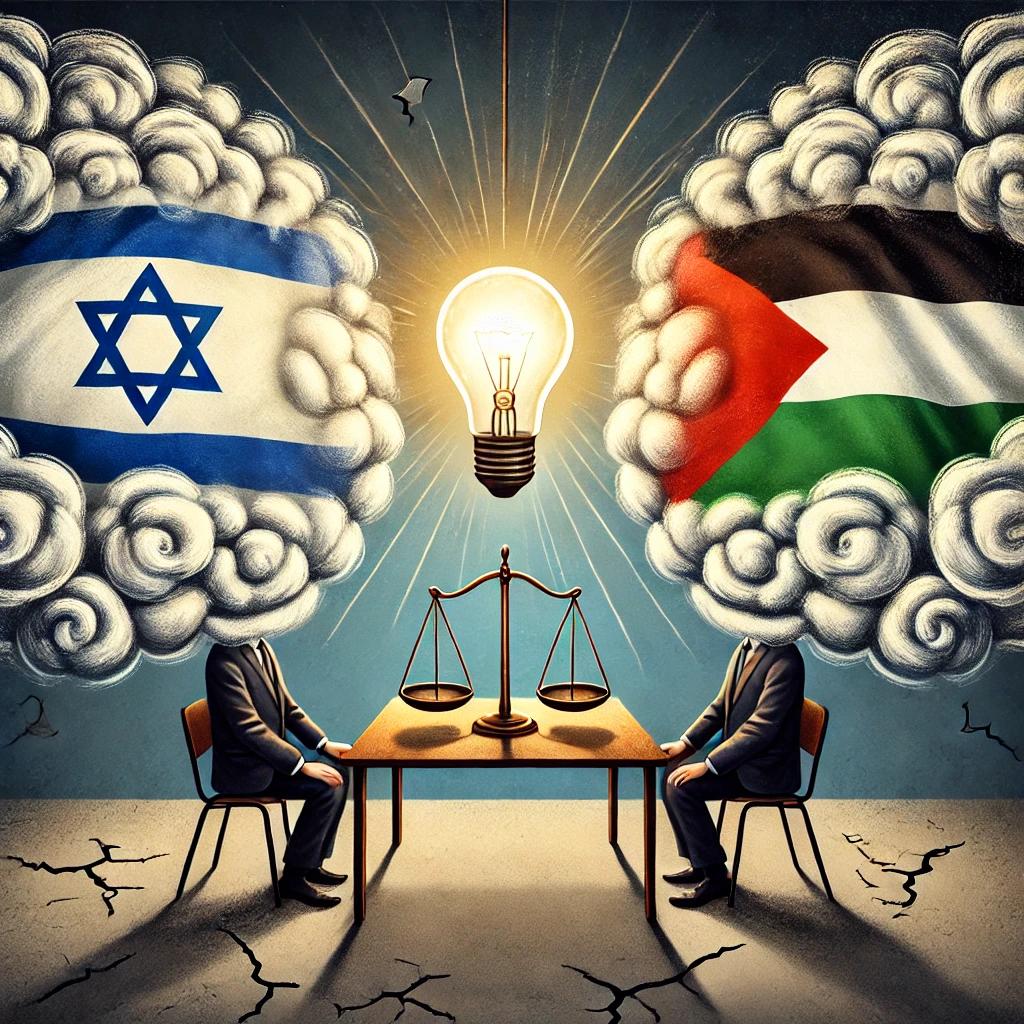Either you are pro-Israeli or pro-Palestinains on X. So these two sides label each other as the worst scum. And if you are objective, maintain the absence of cognitive biases, fallacies, informal fallacies and uphold moral values, well, you are scum too. I have made an observation – Israelis and Palestinians have a common enemy – critical thinking.
How would the whole situation look if both sides had highly developed critical thinking?
Critical thinking and moral judgments
Everything I write is from a common morality standpoint, not from systems such as total utilitarianism. It is close to moral nihilism, yet these moral values ensure that mankind can exist and somehow not kill each other, and provide division of labor on which our economy is based.
Not only do we have critical thinking, but we also navigate the landscape of moral choices, sorting them clearly from tens of thousands of thought threads.
And here is the thing. When you are biased, your side has the superior right to everything. Israelis are innocent and only defend themselves. Palestinians are oppressed, every violent incident is moral, and it is a constant fight. Both sides barely make the distinction between military personnel and civilians.
What cognitive biases and fallacies do they have?

- Confirmation bias
- Both sides tend to seek and interpret information that supports their preexisting beliefs while ignoring evidence that challenges them.
- Ingroup bias
- A preference for the interests and perspectives of their own group, leading to distrust or devaluation of the opposing side.
- Fundamental attribution error
- Attributing the opposing side’s actions to inherent flaws (e.g., aggression, immorality) while justifying their own actions as responses to circumstances.
- Availability heuristic
- Judging the situation based on vivid, recent events (e.g., specific attacks or tragedies) while overlooking broader historical or contextual factors.
- Zero-Sum bias
- Believing that any gain for the other side is a direct loss for their own, fostering an unwillingness to compromise.
Other cognitive biases and fallacies
- Self-serving bias
- Viewing their actions as justified and moral while considering the same actions by the other side as unjustified or immoral.
- Black-and-white thinking (False dichotomy)
- Reducing the conflict to a simple dichotomy of good versus evil, ignoring the complexities and nuances of the situation.
- Groupthink
- Conforming to the dominant views of their community, discouraging dissenting opinions or alternative perspectives within their group.
- Hindsight bias
- Believing past events were predictable and inevitable, reinforcing a narrative that justifies their current stance.
- Anchoring bias
- Fixating on an initial piece of information or historical event (e.g., a war, treaty, or attack) as the foundation for all subsequent judgments.
- Outgroup homogeneity bias
- Viewing the opposing group as monolithic, assuming all members share the same beliefs, behaviors, or intentions.
- Moral licensing
- Justifying harmful actions against the other side by highlighting their perceived moral superiority or past victimhood.
- Projection bias
- Assuming the opposing side thinks and behaves as they would in the same circumstances, leading to misunderstandings and mistrust.
- Overconfidence bias
- Believing their interpretation of events, motives, or history is absolutely correct, dismissing the possibility of being mistaken.
- Escalation of commitment
- Doubling down on actions or beliefs, even when they lead to further harm or conflict, to avoid admitting past errors.
- Stereotyping
- Relying on oversimplified and generalized beliefs about the other side, which reduces empathy and fuels hostility.
- Illusion of transparency
- Believing their intentions and reasoning are clear to others, while assuming the opposing side’s motives are opaque or deceptive.
- Negativity bias
- Giving more weight to negative actions or events attributed to the other side, amplifying animosity and distrust.
- Just-world hypothesis
- Assuming their side’s suffering is undeserved while believing the other side’s suffering is a natural consequence of their actions.
- Status quo bias
- Preferring the continuation of the current state, even if it is harmful, because change is perceived as risky or uncertain.
Common enemy: critical thinking: So let’s be impartial and critical of the Israeli side
You live in lands you have no historical right to. Your state is racist (even within Jewish ethnicities), apartheid, terrorist, and genocidal.
No country in the world can brag about operating the biggest open-air prisons in the world. A few countries conduct state-terrorism (just to make sure, the government itself, not isolated groups, conducts terrorism).
You deprive millions of people of healthcare, food, water, basic human needs, education, employment, freedom of movement, access to proper housing, opportunities for economic growth, foreign investment, the ability to reunite with their families, political representation, freedom of speech, access to justice, cultural preservation, and the right to live without constant fear of violence or displacement.
The number of Palestinians killed since 1948 likely exceeds 100,000. This is a conservative estimate, as precise numbers are unavailable for many periods, and data varies between sources.
The Israeli lobby in the USA (money of the powerful clientelist groups in the US banks, Goldman Sachs, and so on) makes sure to mold policy that every state neighboring Israel is in chaos with an unbelievable number of people dying or struggling.
You have received tons of peace initiatives just to reject them outright.
You arbitrarily torture, shoot, and kill regular Palestinians and journalists. Your prisons are torture chambers and Israel is being nurtured economically from the outside. It would have never become so rich without the outside forces.
So let’s be impartial and critical of the Palestinian side
You have a historical right to the lands, but Israel is a functioning country you cannot remove (or it would be immensely immoral to remove it). Concentrate on the two-state solution.
You conduct terrorism en mass against Israeli civilians, including suicide bombings, rocket attacks, shootings, and stabbings.
Israel is not alone in its rejection of peaceful proposals. You also use human shields.
Palestinian media and education systems foster hatred toward Israel and Jews. This rhetoric perpetuates the conflict by encouraging hostility among future generations. Palestinians also glorify violence.
You kidnap Jews and abuse your own people from a human rights perspective. Arab citizens of Israel who are seen as cooperating with Israeli authorities or integrating into Israeli society are targeted.
You lack democratic elections and promote antisemitism. And militarization of children also isn’t a good step.
Common enemy – critical thinking: Imagine both sides without it

If we presume both of the parties are moral and use critical thinking, all of the confirmation biases, own group perspectives, fundamental attribution errors, and self-serving biases would be gone. Critical thinking would cease to be a common enemy.
There would be no violence, random stabbings, shootings, torture, no terrorist attacks, no hate, everlasting peace, no genocide, no apartheid, or two-state solutions where both states are completely functioning. All of the forms of clientelism would be rejected even if the clientelism (outside) would like to melt.
Both of the countries would be rich, and non-violent, and there would be everlasting friendship.
Critical thinking not just in theory
Critical thinking is not just a theoretical ideal. It is the only path to dismantling the web of biases, hatred, and violence that perpetuates the Israeli-Palestinian conflict. If both parties embraced impartiality, rejected cognitive distortions, and prioritized shared humanity over historical grievances, the consequences would be transformative.
Imagine a world where both Israelis and Palestinians uphold universal moral values, free from the chains of ingroup favoritism or the scars of historical victimhood. Such a paradigm shift would lead to the cessation of violence, the rejection of terrorism, and the dismantling of apartheid and genocide. Two states could thrive side by side, each enriched by peace, mutual respect, and economic cooperation.
In this vision, the media would no longer profit from sensationalizing human suffering, for there would be no horrors to report. Instead, the headlines would celebrate collaboration, progress, and a shared future of prosperity.
The path forward is not easy, but it is clear. Both sides must confront their biases, question their narratives, and embrace the uncomfortable truths that critical thinking unveils. Only then can they transcend the conflict and move toward lasting peace.

Leave a Reply